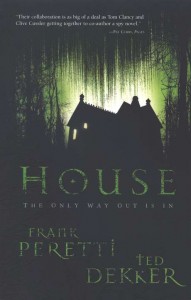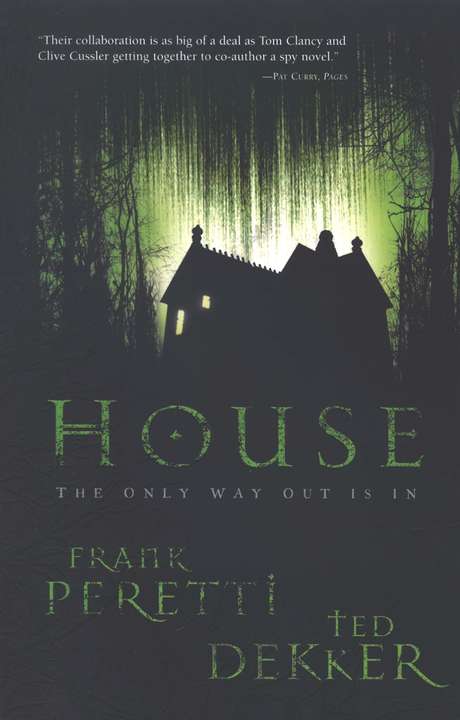Guest Blogger – Matt Koceich
 I remember the first time I looked at the back cover of House and being turned off by three words I found there. “I killed God” written on a soup can to be precise, did not (and still doesn’t) sit well with me. Yes, the story’s antagonist wrote the phrase to freak out the ‘good guys,’ but it gave me a reason not to buy a copy. So, when I was invited to write a post I thought about different books to discuss, but came back to this one.
I remember the first time I looked at the back cover of House and being turned off by three words I found there. “I killed God” written on a soup can to be precise, did not (and still doesn’t) sit well with me. Yes, the story’s antagonist wrote the phrase to freak out the ‘good guys,’ but it gave me a reason not to buy a copy. So, when I was invited to write a post I thought about different books to discuss, but came back to this one.
My goal with this is to start a discussion of the novel and not offer critique or criticism. I really enjoy Dekker and Peretti. They are masters of the craft.
Dekker did a book signing in the area and I remember picking up a copy of House for him to autograph. The excitement of meeting Ted gave me the little mental shove I needed to start reading House.
A friend of mine has a Facebook profile picture that has the phrase, “I killed Jesus.” That got me to thinking…what sounds weird and disturbing at first glance might have real meaning after careful consideration. Because of my sin, Jesus did die on the cross. And praise his holy name that He loved me that much to do so!
House opens up with a Psycho-esque set of chapters where the main set of characters end up at a roadside inn nestled in the “Alabama backwoods.”
The antagonist, Barsidious White, orchestrates a game of horror by locking the characters in the old Victorian house and telling them that the game will end when one of them dies.
A cool element of the book that resonated with is a girl named Susan who appears halfway through the novel as a mysterious savior figure. She alone knows how to navigate through the murky places underneath the house. However, Susan doesn’t lead the crew to immediate safety. She goes missing and our cast becomes divided on whether they should save themselves or risk their own skin to go looking for her.
After they decide to look go in search of Susan, doubt enters into the picture. The characters start to consider Susan to be in a partnership with White. I like this element because it reflects a ton of my own spiritual journey. On Sunday, God feels real close. By Monday morning, when life happens, He feels distant. Funny thing is, God hasn’t gone anywhere. He pursues me, but I let doubt blind my heart and miss His beautiful presence.
Like a roller coaster, the plot goes up to cool places and back down to spots you might not miss. One of the main characters, Jack, begins to encounter other men in the house that look, act, and sound just like him. His twins shout to him for evil actions. The dark side of his own being tempts the real Jack to try and kill Susan.
Later, we are given a meaty explanation that the house is really a product of one’s heart. The people running the inn are really demons powered by the evil desires of the human heart. Susan dies so that the rest may live.
In case you haven’t read the story, I don’t want to ruin the ending. The last chapter is a nice walk through the garden of pleasant things. It made me feel like I had gone some place meaningful. I think Isaiah 61:4 is a nice summary of House: they will rebuild the ancient ruins and restore the places long devastated.
It makes me think of the entire novel as a mirror, showing me inside the spiritual realm where sin tries to make a mockery of things. But, in the end, God’s grace pours down and makes everything clean again. That is sufficient. All I need. And one day we, too, will all be restored!
I can’t wait to hear your thoughts. Have a great day.





































Hi Matt,
Glad you enjoyed House. I’m also a huge fan of Ted Dekker and Frank Peretti’s works. I thought the story was good but that the blending of two very good (but very different) authors left us with a half-baked story and underdeveloped characters. It’s a real pity too because some scenes are fantastic and suprisingly creepy. That the house is a metaphor for the human heart brings proper stakes to the story and real depth to a tired genre. House both challenges and encourages the reader. I wonder how different the end-product would’ve been had Ted Dekker written it alone (as he was going to do originally). We’ll never know. I found it to be one of Dekker’s and Peretti’s weakest works but the premise is most intriguing and thought-provoking. There’s also a movie based on the book. It’s not great but it’s decent. Some parts improve on the book (those originally designed by Dekker), and others detract from the story. Decide for yourself.
Hi Christian,
Thanks for the great comment. I didn’t realize Dekker had originally intended to write it alone. When he signed my copy of House, I asked him what part(s) did he write. Ted told me he wrote chapters 10 and following. I did hear that they made a movie, but I haven’t seen it yet.
Dekkar is hard to get into for me. But I am always intrigued by his plots. One of these days I will read his books, most especially House, since this post has snagged my interest.
Hi Nikole,
Thanks for your reply! This was my hope from the post–to share thoughts. My favorite of his is Obsessed. Very emotional story.
Matt
Obsessed was one of the very few books (by Dekker or anyone else) that I actually stopped reading halfway through. Perhaps I wasn’t paying attention and this story was actually brilliant; I remember finding it difficult to relate to. Also my only memories from what I did read involve flashbacks to former Nazis, and a real-estate agent going into a house he’s trying to sell, going into the house over and over and over.
It’s likely I missed something, and maybe I’ll go back and try it again sometime soon.
As for House, I’m thinking I must not be understanding the horror genre. Some have said it’s not the best of Peretti’s and Dekker’s works; I would say more, but most of what I said was in a review I wrote shortly after its 2006 release.
To me the whole thing felt rather rushed. And try as I might, I cannot make any sense of this line at the bottom of page 110 (maybe they fixed it in other printings).